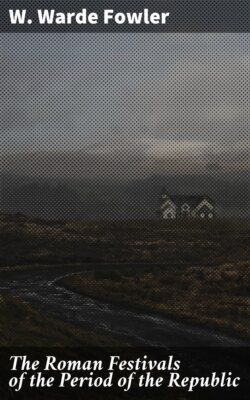Читать книгу The Roman Festivals of the Period of the Republic - W. Warde Fowler - Страница 7
На сайте Литреса книга снята с продажи.
III. The Divisions of the Month.
ОглавлениеTable of Contents
The Romans, with their usual conservatism, preserved the shell of the lunar system of reckoning long after the reality had disappeared. The month was at all times divided by the real or imaginary phases of the moon, though a week of eight days was introduced at an early period, and though the month was no longer a lunar one.
The two certain points in a lunar month are the first appearance of the crescent[15] and the full moon; between these is the point when the moon reaches the first quarter, which is a less certain one. Owing to this uncertainty of the reckoning of the first days of the month there were no festivals in the calendars on the days before the first quarter (Nones), with a single exception of the obscure Poplifugia on July 5. The day of the new moon was called Kalendae, as Varro tells us, ‘quod his diebus calantur eius mensis nonae a pontificibus, quintanae an septimanae sint futurae, in Capitolio in curia Calabra sic: Dies te quinque calo, Iuno Covella. Septem dies te calo Iuno Covella’[16]. All the Kalends were sacred to Juno, whose connexion with the moon is certain though not easy to explain.
With the Nones, which were sacred to no deity, all uncertainty ceased. The Ides, or day of the full moon, was always the eighth after the first quarter. This day was sacred to Jupiter; a fact which is now generally explained as a recognition of the continuous light of the two great heavenly bodies during the whole twenty-four hours[17]. On the Nones the Rex sacrorum (and therefore before him the king himself) announced the dates of the festivals for the month.
There was another internal division of the month, with which we are not here specially concerned, that of the Roman week or nundinal period of eight days, which is indicated in all the calendars by the letters A to H. The nundinae were market days, on which the rustic population came into Rome; whether they were also feast days (feriae) was a disputed question even in antiquity.
